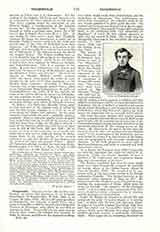

Tocqueville, CHARLES-ALEXIS-HENRI-MAURICE CLEREL DE, writer and statesman, b. at Verneuil, Department of Seine-et-Oise, July 29, 1805; d. at Cannes, April 16, 1859. He was the great-grandson of Malesherbes, the defender of Louis XVI. As a judge at Versailles in 1830 he formed a friendship with Gustave de Beaumont, with whom he traveled to America in 1831. Tocqueville’s letters show that he foresaw what strides the Church was destined to make in America and likewise the dogmatic nothingness which would result from Unitarianism and the absurdities of Illuminism. Two publications resulted from this journey: the collective work of the two friends published in 1832 under the title “Du système pénitentiaire aux Etats-Unis et de son application en France“; the second, Tocqueville’s personal work, is the celebrated book “La démocratie en Amérique”, of which the first volume appeared in 1835 and the second in 1840. The work won for Tocqueville admission to the Académie des sciences morales et politiques (1838) and the French Academy (1841).
The library of the Seminary of St-Sulpice preserves a copy of “La Démocratie” annotated by Msgr. Bruté, first Bishop of Vincennes, who registered in the margin a number of exceptions to Tocqueville’s assertions. Those notes have been transcribed by Msgr. Baunard. Tocqueville held that democracy could exist only by seeking a moral support in religion, and that religion could prosper only by accommodating itself to democracy, but he is inclined to regard as too severe the doctrinal, disciplinary, and liturgical exactions of Catholicism, and in Msgr. Baunard’s opinion his work leaves the impression that he was only half Catholic.
The work has been charged with several serious defects as regards political observation; he dealt at too great length with the constitution and organism of the central government, paying too little attention to the provincial legislation of the various states of the Union. He relegates to the end of the first part the study of what he calls “the accidental or providential causes” of the maintenance of the democracy, and his work would be clearer if he had treated in the beginning the geographical and economic conditions of America. As his work progresses he loses sight of American democracy and deals in a general way with democratic societies.
As a deputy for Valognes from 1839 Tocqueville sat with the opposition and voted for liberty of instruction. Under the Second Republic he was a member of the Constituent and Legislative Assemblies and vice-president of the latter.
The Roman expedition had been for some weeks under way when Tocqueville assumed the portfolio for foreign affairs in the Odilon Barrot cabinet (June 2-October 31, 1849). He caused it to be proceeded with, at the same time writing to the French ambassador Corcelle: “The Roman question is the mountain which threatens to bury us all.” He recommended that Oudinot’s army refrain from bombarding the monuments of Rome, which were, he wrote to Corcelle, “the property of the Christian world”, and according to his instructions Pius IX’s return should have been accompanied by an amnesty and the granting of a Constitution.
Under the Empire he returned to private life and undertook his work “L’ancien régime et la révolution”, of which only the first part appeared (1856). In pages of beautiful religious psychology Msgr. Baunard has shown how Tocqueville’s mind and conscience, chiefly under Madame Swetchine’s influence, climbed upwards toward a profoundly Christian death. These pages are an interesting document on the evolution of the Liberal ideas of the middle of the nineteenth century. After Tocqueville’s death Gustave de Beaumont collected his works in nine volumes. Tocqueville’s memoirs of the Republic of 1848 were published in 1893, his correspondence with Gobineau in 1908.
GEORGES GOYAU.

